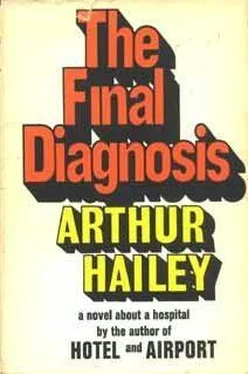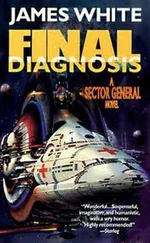Arthur Hailey - The Final Diagnosis
Здесь есть возможность читать онлайн «Arthur Hailey - The Final Diagnosis» весь текст электронной книги совершенно бесплатно (целиком полную версию без сокращений). В некоторых случаях можно слушать аудио, скачать через торрент в формате fb2 и присутствует краткое содержание. Жанр: Триллер, на английском языке. Описание произведения, (предисловие) а так же отзывы посетителей доступны на портале библиотеки ЛибКат.
- Название:The Final Diagnosis
- Автор:
- Жанр:
- Год:неизвестен
- ISBN:нет данных
- Рейтинг книги:4 / 5. Голосов: 1
-
Избранное:Добавить в избранное
- Отзывы:
-
Ваша оценка:
- 80
- 1
- 2
- 3
- 4
- 5
The Final Diagnosis: краткое содержание, описание и аннотация
Предлагаем к чтению аннотацию, описание, краткое содержание или предисловие (зависит от того, что написал сам автор книги «The Final Diagnosis»). Если вы не нашли необходимую информацию о книге — напишите в комментариях, мы постараемся отыскать её.
The Final Diagnosis — читать онлайн бесплатно полную книгу (весь текст) целиком
Ниже представлен текст книги, разбитый по страницам. Система сохранения места последней прочитанной страницы, позволяет с удобством читать онлайн бесплатно книгу «The Final Diagnosis», без необходимости каждый раз заново искать на чём Вы остановились. Поставьте закладку, и сможете в любой момент перейти на страницу, на которой закончили чтение.
Интервал:
Закладка:
At first O’Donnell failed to see Eustace Swayne. Instead his eyes were caught by a massive fireplace framing a roaring log fire. The heat from the fire was like an impact, the room almost unbearably hot on the already mild late-August morning. Then he saw Swayne, propped up by pillows in a huge four-poster bed, a monogrammed robe draped around his shoulders. As he approached O’Donnell noticed with shock how frail the old man had become since their last meeting—the night of the dinner with Orden Brown and Denise.
“Thank you for coming,” Swayne said. His voice, too, was weaker than before. He motioned his visitor to a chair beside the bed.
As he seated himself O’Donnell said, “I heard you wanted to see me.” In his own mind he was already revising some of the forthright statements which earlier he had planned to make. Nothing would change his own stand, of course, concerning Joe Pearson, but at least he could be gentle. O’Donnell had no wish now to tangle with this ailing old man; any contest between them would be too uneven.
“Joe Pearson has been to see me,” Swayne said. “Three days ago, I think it was.”
So that was where Pearson had been those missing hours when they were trying to locate him. “Yes,” O’Donnell answered, “I imagined he would.”
“He told me that he’s leaving the hospital.” The old man’s voice sounded weary; there was no hint so far of the denunciation of O’Donnell which the chief of surgery had expected.
Curious about what was coming next, he answered, “Yes, that’s true.”
The old man was silent. Then he said, “I suppose there are some things no one can control.” There was a trace of bitterness now. Or was it resignation? It was hard to be sure.
“I think there are,” O’Donnell answered gently.
“When Joe Pearson came to see me,” Eustace Swayne said, “he made two requests. The first was that my donation to the hospital building fund should have no stipulations attached. I have agreed.”
There was a pause, O’Donnell silent, as the significance of the words sank in. The old man went on, “The second request was a personal one. You have an employee at the hospital—his name is Alexander, I believe.”
“Yes,” O’Donnell said wonderingly. “John Alexander—he’s a laboratory technologist.”
“They lost a child?”
O’Donnell nodded.
“Joe Pearson asked that I pay the boy’s way through medical school. I can do it, of course—quite easily. Money at least has a few remaining uses.” Swayne reached for a thick manila envelope which had been lying on the quilt. “I have already instructed my lawyers. There will be a fund—enough to take care of fees and for him and his wife to live comfortably. Afterward, if he chooses to specialize, there will be money for that too.” The old man paused, as if tired by speaking. Then he continued, “What I have in mind now is something more permanent. Later there will be others—I suppose equally deserving. I would like the fund to continue and to be administered by the Three Counties’ medical board. I shall insist on only one condition.”
Eustace Swayne looked squarely at O’Donnell. He said defiantly, “The fund will be named the Joseph Pearson Medical Endowment. Do you object?”
Moved and ashamed, O’Donnell answered, “Sir, far from objecting, in my opinion it will be one of the finest things you have ever done.”
“Please tell me the truth, Mike,” Vivian said. “I want to know.”
They faced each other—Vivian in the hospital bed, Mike Seddons standing, apprehensively, beside it.
It was their first meeting following their time apart. Last night, after cancellation of Vivian’s transfer order, she had tried a second time to reach Mike by telephone, but without success. This morning he had come, without her calling, as they had arranged six days ago. Now her eyes searched his face, fear nudging her, instinct telling what her mind refused to know.
“Vivian,” Mike said, and she could see him trembling, “I’ve got to talk to you.”
There was no answer, only Vivian’s steady gaze meeting his own. His lips were dry; he moistened them with his tongue. He knew that his face was flushed, felt his heart pounding. His instinct was to turn and run. Instead he stood, hesitating, groping for words which refused to come.
“I think I know what you want to say, Mike.” Vivian’s voice was flat; it seemed drained of emotion. “You don’t want to marry me. I’d be a burden to you—now, like this.”
“Oh, Vivian darling—”
“Don’t, Mike!” she said. “Please don’t!”
He said urgently, imploringly, “Please listen to me, Vivian—hear me out! It isn’t that simple . . .” Again his speech faltered.
For three days he had sought the right words and phrases to meet this moment, yet knowing whatever form they took the effect would be the same. In the interval between their last meeting Mike Seddons had probed the inner chasms of his soul and conscience. What he had found there had left him with disgust and self-contempt, but he had emerged with truth. He knew with certainty that a marriage between himself and Vivian would never succeed—not because of her inadequacy, but through his own.
In moments of searching self-examination he had forced himself to consider situations the two of them might meet together. In a flood light of imagination he had seen them entering a crowded room—himself young, virile, unimpaired; but Vivian on his arm, moving slowly, awkwardly, perhaps with a cane, and only as an artificial limb allowed. He had seen himself dive through surf, or lie on a beach near-naked in the sun, but with Vivian dressed decorously, sharing none of it because a prothesis was ugly when exposed and, if removed, she would become a grotesque, immobile freak—an object for pitying or averted eyes.
And more than this.
Overcoming every reluctance and instinctive decency, he had let himself consider sex. He had pictured the scene at night, before bed. Would Vivian unstrap her synthetic leg alone, or would he help her? Could there be intimacies of undressing, knowing what lay beneath? And how would they make love—with the leg on or off? If on, how would it be—the hard, unyielding plastic pressing against his own urgent body? If off, how would the stump feel beneath him? Would there be fulfillment—in intercourse with a body no longer whole?
Mike Seddons sweated. He had plumbed the depths and found his own reflection.
Vivian said, “You needn’t explain, Mike.” This time her voice was choked.
“But I want to! I’ve got to! There are so many things we both have to think of.” Now the words came quickly, tumbling out in an eager effort to make Vivian understand, to know the agony of mind he had suffered before coming here. Even at this moment he needed her understanding.
He started to say, “Look, Vivian. I’ve thought about it and you’ll be better off . . .”
He found her eyes regarding him. He had never noticed before how steady and direct they were. “Please don’t lie, Mike,” she said. “I think you’d better go.”
He knew it was no good. All that he wanted now was to get away from here, not to have to meet Vivian’s eyes. But still he hesitated. He asked, “What will you do?”
“I really don’t know. To tell you the truth, I haven’t thought much about it.” Vivian’s voice was steady, but it betrayed the effort she was making. “Perhaps I’ll go on in nursing, if they’ll have me. Of course, I really don’t know if I’m cured, and if I’m not, how long I’ve got. That’s so, isn’t it, Mike?”
He had the grace to lower his eyes.
At the doorway he looked back for the last time. “Good-by, Vivian,” he said.
She tried to answer, but her self-control had been taxed too long.
Читать дальшеИнтервал:
Закладка:
Похожие книги на «The Final Diagnosis»
Представляем Вашему вниманию похожие книги на «The Final Diagnosis» списком для выбора. Мы отобрали схожую по названию и смыслу литературу в надежде предоставить читателям больше вариантов отыскать новые, интересные, ещё непрочитанные произведения.
Обсуждение, отзывы о книге «The Final Diagnosis» и просто собственные мнения читателей. Оставьте ваши комментарии, напишите, что Вы думаете о произведении, его смысле или главных героях. Укажите что конкретно понравилось, а что нет, и почему Вы так считаете.












